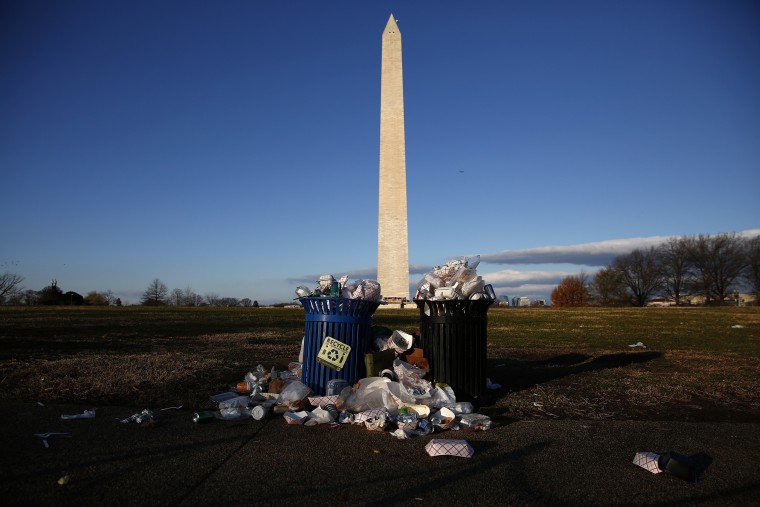For more than two years, Britain has gone through convulsions over its efforts to shed its ties with the European Union. For the same two years, the United States has gone through equivalent paroxysms surrounding the debate over the construction of a wall along the length of the nation‘s southern border.
Both fights now seem to be nearing their conclusion — whatever that is. Britain dramatically voted down a Parliament plan on Tuesday, dealing a catastrophic blow to the government of Prime Minister Theresa May. In the United States, the bitter shutdown standoff between Republicans and Democrats is putting increasing pressure on all parties as paychecks stop showing up. On Wednesday, House Speaker Nancy Pelosi told President Donald Trump that he should postpone his annual State of the Union address on January 29. On Thursday, Trump responded by postponing Pelosi's planned trip abroad.
America is the only major nation to shut down when its legislators and its president can’t come to an agreement on various political grievances.
But there is one critical difference regarding the chaos currently engulfing these two close allies: At no time during this period has the British government ground to a halt. Travelers at British airports have whisked efficiently through safety checks. The House of Parliament, Westminster Abbey and every British monument, remain fully open. Trash is still being collected as well as taxes, food has been inspected for safety, every British official has received a paycheck.
Not so in the United States, where 21 times in close to 40 years, the wheels of government have ground to an increasingly debilitating halt. America is the only major nation to shut down when its legislators and its president can’t come to an agreement on various political grievances.
“We are the only OECD country that links services provision to budget approvals,” Professor George M. Guess of George Mason University confirmed to me over email. (The OECD is a group of 36 of the world’s most developed nations.) And indeed there have been any number of cases where Western legislatures and even governments have lapsed or frozen and the bureaucracy has continued to rumble relatively smoothly along.
Belgium is a fascinating, if extreme, case. For 589 days between 2010 and 2011, the nation was without a government — divided between 6.5 million Dutch-speaking Flemish in the north and 4.5 million French-speaking Walloons in the south. In the end, seemingly only the threat of a downgrade to its national credit rating finally forced both sides to an uneasy compromise of sorts. Yet throughout the crisis, all major government services continued functioning up until King Albert II finally swore in a new coalition cabinet.
In many parliamentary democracies — including much of the old British empire from the United Kingdom to Australia, the failure to pass a budget or some other critical piece of legislation can result in the fall of the government itself, leading to a new cabinet or, when a total impasse arrives, a new national election.
This is what Theresa May has been trying desperately to avoid (on Wednesday, she barely survived a no confidence vote.) She may yet be forced to step aside, but government services will remain uninterrupted — unless something even more catastrophic happens when the Brexit clock runs out.
The consequences of American shutdown are readily apparent. The small stuff — trash going uncollected, for example — is more easily fixed than the growing number of people who are being forced to take second jobs. Broader still, economists warn a more prolonged shutdown could do substantial economic damage. Already, the president’s own Council of Economic Advisors estimates the shutdown has slashed 0.5 percent from this quarter’s economic growth, sending it below 2 percent.
There are also symbolic consequences. A nation who cannot reliably pay its TSA screeners is not exactly projecting a strong image abroad.
China has hardly been reluctant to seize on what its leadership clearly sees as cracks in the American system. U.S. government shutdowns have demonstrated “fatal flaws” in its political mechanisms, said the state news agency. And this comment was made during the last big government shutdown, a year ago. “What’s so ironic is that it came on the first anniversary of Donald Trump’s presidency, a slap in the face for the leadership in Washington,” China’s Xinhua News Agency’s writer Liu Chang noted.
Given the trade standoff, this is hardly the time for Trump to be looking weak. The American president needs a big win. So far, he is not getting it.
The underlying question is whether America’s very system of government may be out of date. The Constitution, 230 years old, patched 27 times, is no longer the same beacon used by nations seeking to rewrite or initiate their own. The Founding Fathers effectively wrote into their document in Article I that: “No Money shall be drawn from the Treasury, but in Consequence of Appropriations made by Law.” In other words, if Congress doesn’t appropriate it and the president doesn't sign for it, government funding simply dries up.
This contrasts with, say, Canada, today a model for many new constitutions around the world, where failure to pass a budget leads to a new election entirely, with the previous budget operating until a new one is voted. In theory, Congress in its wisdom could try a legislative fix, allowing the automatic funding of large parts of the government if a budget is in hiatus. But would any legislator seriously be prepared to give up such a potent weapon?
The U.S. and Britain may both find themselves locked in a race to the bottom that neither wants to win. But it seems notable that one nation is able to keep the lights on, even as its Parliament appears on the verge of total upheaval. Meanwhile the other is grinding slowly and inexorably to a halt.

